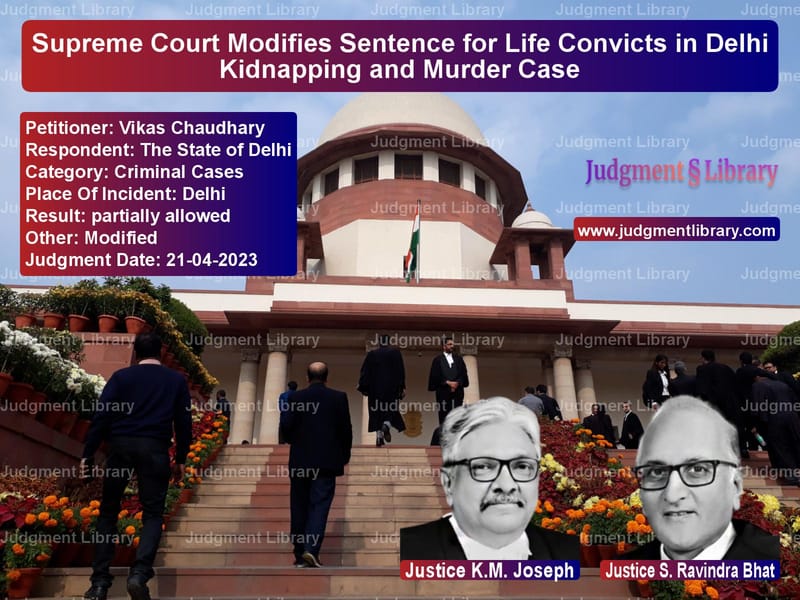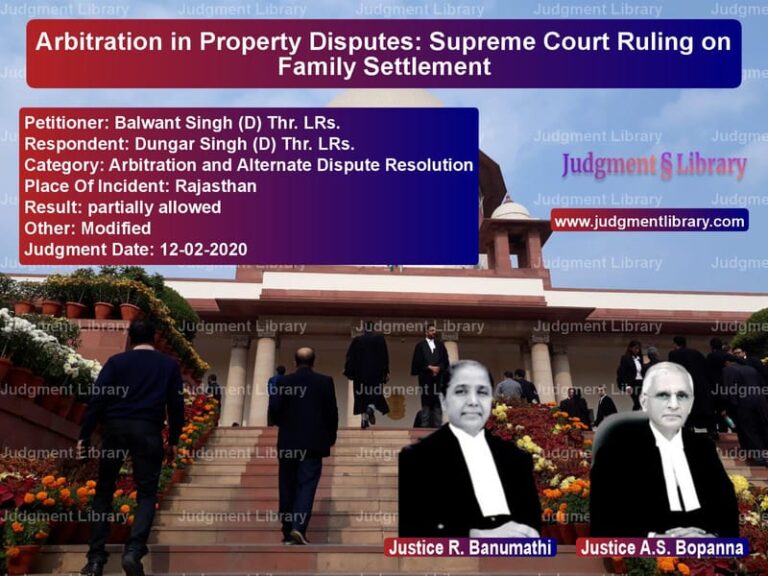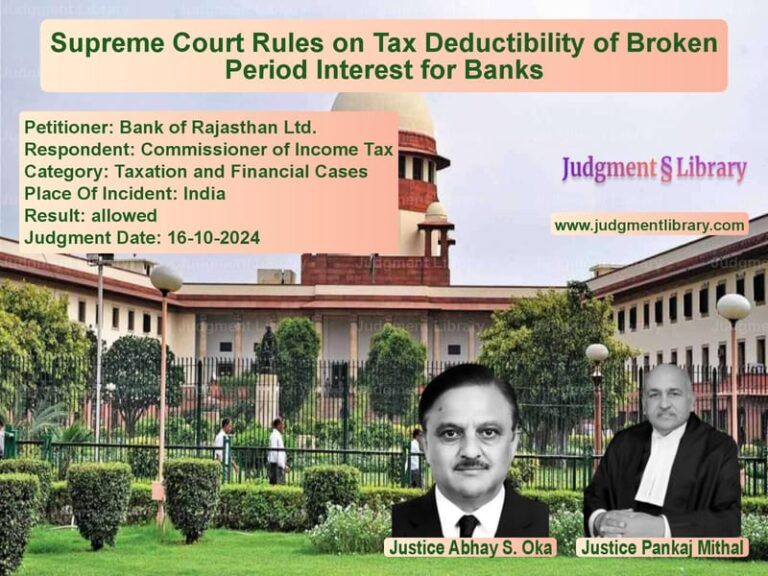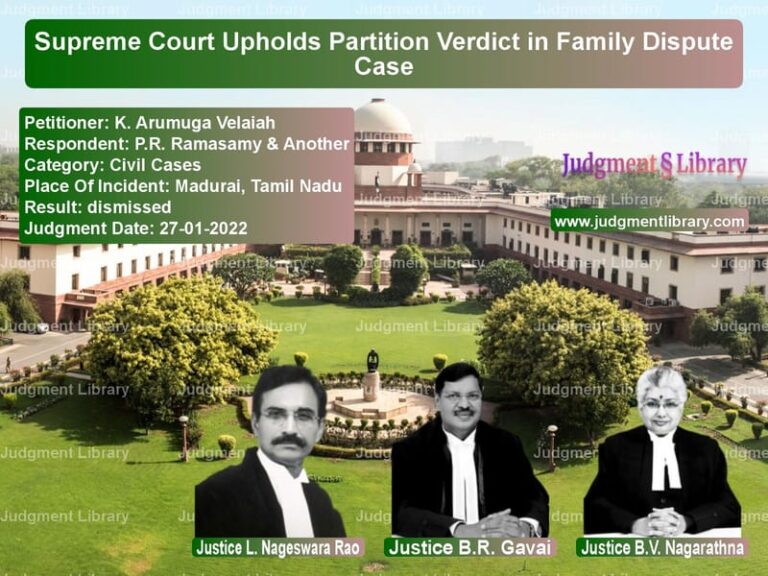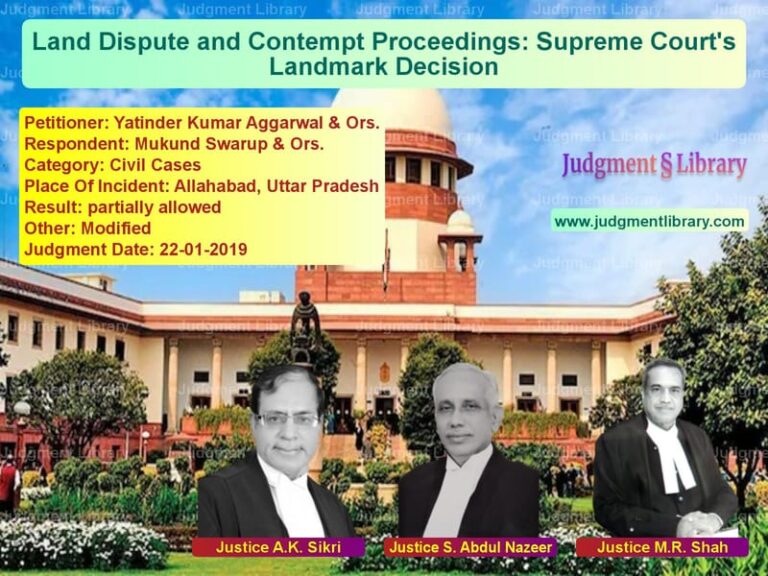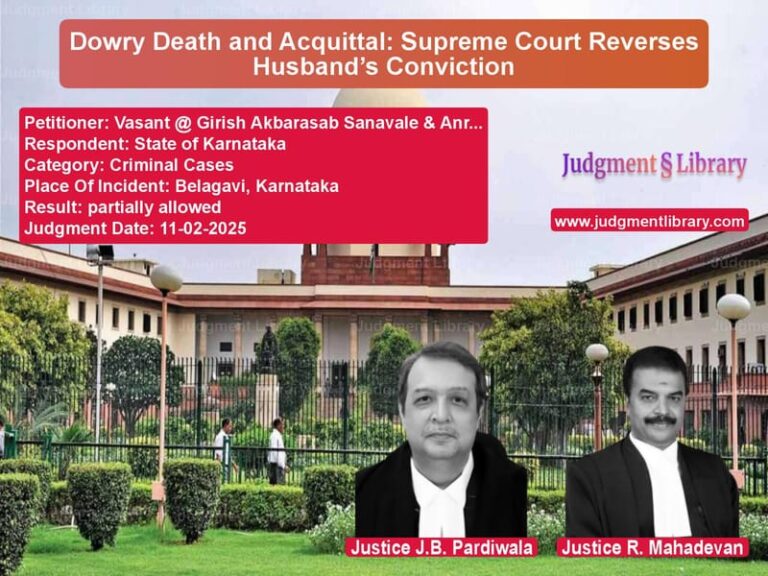Supreme Court Modifies Sentence for Life Convicts in Delhi Kidnapping and Murder Case
The Supreme Court of India, in a crucial ruling on sentencing, addressed the case of Vikas Chaudhary vs. The State of Delhi. The case revolved around the sentencing of two convicts who were found guilty of kidnapping and murdering an 18-year-old boy for ransom in 2003. The apex court ruled that the trial court and Delhi High Court had erred in imposing a fixed-term sentence of 30 years without remission, and instead modified the sentence to a minimum term of 20 years actual imprisonment.
Background of the Case
The case arose from the abduction and murder of an 18-year-old victim on January 18, 2003. The victim was kidnapped for ransom, but was strangled on the same day and his body was burnt in an attempt to destroy evidence. The victim’s father received multiple ransom calls, unaware that his son had already been killed.
The key developments in the investigation were:
- Police tracked ransom calls and arrested the accused, recovering the deceased’s personal belongings.
- Voice samples and forensic evidence linked the accused to the crime.
- A partially burned dead body was found in a drain the day after the abduction, later identified as the victim.
Trial and Conviction
The trial court convicted the accused under Sections 302, 364A, 201, and 120B of the Indian Penal Code. The key sentences imposed were:
- Life imprisonment for the remainder of their natural lives.
- A condition that they would not be entitled to parole, remission, or furlough before serving 30 years of imprisonment.
- Fines and compensation to the victim’s family.
The Delhi High Court upheld the convictions and sentences, but acquitted one of the co-accused due to lack of evidence.
Legal Issues Examined
1. Can trial courts impose fixed-term life sentences beyond their statutory authority?
The Supreme Court examined whether trial courts had the power to impose life imprisonment with a fixed-term restriction on remission.
2. Was the sentencing in line with previous Supreme Court rulings on life imprisonment?
The court analyzed the sentencing framework established in Union of India v. Sriharan (2015), which held that only the Supreme Court and High Courts can impose fixed-term life sentences beyond 14 years.
3. Were mitigating circumstances considered in sentencing?
The Supreme Court considered whether the lower courts had properly evaluated the possibility of reformation and rehabilitation before sentencing.
Arguments Presented
Petitioners (Vikas Chaudhary & Vikas Sidhu) Arguments
- The trial court exceeded its authority by imposing a fixed-term sentence of 30 years without remission.
- The Supreme Court’s ruling in Swamy Shraddananda (2008) and Sriharan (2015) limited such sentencing powers to High Courts and the Supreme Court.
- They had no criminal antecedents and had shown good conduct in jail, demonstrating a possibility of reform.
- The trial and High Court failed to consider mitigating circumstances, as required by sentencing principles.
Respondent (State of Delhi) Arguments
- The crime was premeditated and involved brutal execution, justifying a severe sentence.
- The accused made ransom demands even after the victim was killed, showing a calculated intent.
- The sentencing was necessary to prevent early release, given the heinous nature of the crime.
- The High Court had affirmed the trial court’s sentence, and there was no reason for modification.
Supreme Court’s Observations
The Supreme Court, led by Justices K.M. Joseph and S. Ravindra Bhat, made the following key observations:
- The trial court lacked the jurisdiction to impose a fixed-term life sentence with a 30-year restriction on remission.
- As per Sriharan (2015), such sentences can only be imposed by High Courts or the Supreme Court.
- Sentencing courts must consider reformation and rehabilitation, particularly when dealing with young offenders.
- The conduct of the accused during their 17 years of incarceration showed potential for reintegration into society.
The Court noted:
“While the gravity of the offense is undeniable, sentencing must align with established judicial principles. The punishment should serve the goals of justice, reformation, and deterrence.”
Final Judgment
The Supreme Court ruled as follows:
- The sentence was modified from a 30-year fixed-term life sentence to a minimum of 20 years actual imprisonment.
- The sentence will run without remission for the first 20 years.
- Prison authorities must evaluate the convicts for possible release after 20 years.
Implications of the Judgment
The ruling has significant implications for sentencing in serious criminal cases:
- Clarifies Judicial Authority: The ruling reiterates that only High Courts and the Supreme Court can impose fixed-term life sentences beyond statutory limits.
- Reformation-Based Sentencing: The decision highlights the need to consider rehabilitation and post-conviction conduct in sentencing.
- Standardization of Sentencing: The ruling ensures consistency in life imprisonment sentences across jurisdictions.
Conclusion
The Supreme Court’s decision in Vikas Chaudhary vs. The State of Delhi reinforces the principles of proportional sentencing and reformation in criminal justice. The ruling ensures that courts follow established legal frameworks while sentencing convicts in serious cases.
By modifying the fixed-term life sentence to 20 years of actual imprisonment, the Supreme Court has struck a balance between punishment and the possibility of rehabilitation. This decision serves as an important precedent in guiding future sentencing practices in India.
Petitioner Name: Vikas Chaudhary.Respondent Name: The State of Delhi.Judgment By: Justice K.M. Joseph, Justice S. Ravindra Bhat.Place Of Incident: Delhi.Judgment Date: 21-04-2023.
Don’t miss out on the full details! Download the complete judgment in PDF format below and gain valuable insights instantly!
Download Judgment: vikas-chaudhary-vs-the-state-of-delhi-supreme-court-of-india-judgment-dated-21-04-2023.pdf
Directly Download Judgment: Directly download this Judgment
See all petitions in Bail and Anticipatory Bail
See all petitions in Attempt to Murder Cases
See all petitions in Custodial Deaths and Police Misconduct
See all petitions in Judgment by K.M. Joseph
See all petitions in Judgment by S Ravindra Bhat
See all petitions in partially allowed
See all petitions in Modified
See all petitions in supreme court of India judgments April 2023
See all petitions in 2023 judgments
See all posts in Criminal Cases Category
See all allowed petitions in Criminal Cases Category
See all Dismissed petitions in Criminal Cases Category
See all partially allowed petitions in Criminal Cases Category

